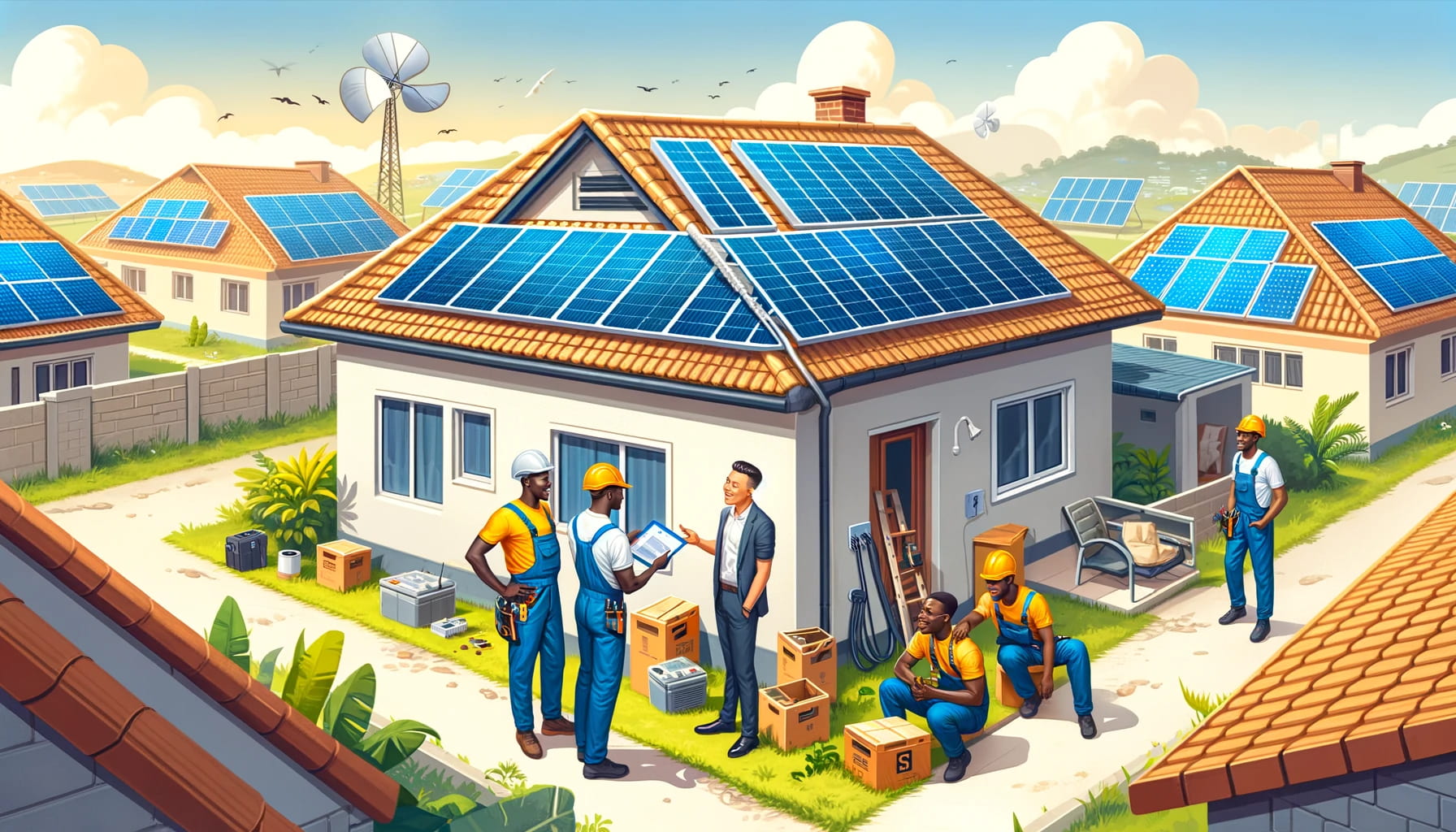
Solar Power Systems for Homes: A Guide to Going Green in Ghana
As Ghana strides towards a sustainable future, solar power emerges as a beacon of hope for homeowners. With the global shift to renewable energy sources gaining momentum, the benefits of solar energy in residential settings are becoming increasingly apparent. This guide explores why solar power is an attractive option for Ghanaian homeowners, focusing on cost savings, energy independence, and environmental stewardship
Cost Savings: The Economic Advantage
Embracing solar energy in Ghana offers substantial cost savings, a significant draw for many homeowners. Traditional electricity sources, often dependent on fossil fuels, are subject to price fluctuations that can strain household budgets. Solar power, leveraging Ghana’s abundant sunlight, provides a more stable and predictable cost. After the initial investment in solar panels and equipment, homeowners can enjoy years of virtually free electricity, with many systems paying for themselves within a few years. This leads to significantly reduced monthly electricity bills, if not complete grid independence.
Energy Independence: Power on Your Terms
Solar energy is indeed a remarkable source of power that provides homeowners with a multitude of benefits. By harnessing the sun’s abundant energy, individuals can achieve a remarkable level of energy independence. This means less reliance on traditional power sources and a reduced vulnerability to power outages and grid fluctuations.
One significant advantage of solar energy is its ability to address the issue of inconsistent electricity supply in certain regions. Many areas in Ghana experience unreliable power access, which can disrupt daily activities and hinder progress. However, solar homes can overcome this challenge by generating electricity on-site. With a solar power system in place, homeowners can enjoy a continuous power supply, regardless of any disruptions in the grid. This is made possible through the use of batteries, which store excess energy produced during sunny days. The stored energy can then be utilized during cloudy days or even during the night, ensuring a consistent power supply at all times.
Aside from providing a reliable source of electricity, solar energy also contributes to a better quality of life. Having a solar-powered home means having peace of mind during power disruptions. Whether it’s a sudden blackout or an extended outage, solar energy can be a lifesaver. Homeowners can continue to power their essential appliances and devices, ensuring that their daily routines are not severely impacted. This is particularly beneficial for households with sensitive equipment that requires continuous power supply or those who work from home and cannot afford to lose connectivity.
Step-by-Step Guide to Going Solar
- Assessment of Solar Viability: Evaluate your home’s solar potential and energy needs. Consult with experts to understand the amount of sunlight your location receives and the suitability of your home’s orientation and roof condition for solar panel installation.
- Understanding the Investment: Analyze the costs involved, including purchasing panels and installation. Factor in the long-term savings on electricity bills against the initial outlay. Remember, solar systems often pay for themselves within a few years through reduced energy costs.
- Selecting the Right System: Choose between monocrystalline or polycrystalline panels, and decide on the size of the solar system that fits your energy requirements and budget.
- Finding a Reputable Installer: Research and select a qualified solar installer with a proven track record to ensure a high-quality installation and to avoid scams. Suka solar has been delivering high quality product and services to all our customers since inception. We have embarked on both large scale and domestic installation, don’t hesitate to contact us.
- Installation and Grid Integration: Work with your installer to set up the system. If you choose a grid-tied system, coordinate with local utilities for integration and potential feed-in tariffs.
- Maintenance for Longevity: Plan for regular maintenance to ensure the system operates at peak efficiency, including cleaning panels and servicing inverters and batteries.
Environmental Benefits: Contributing to a Greener Tomorrow

The environmental advantages of solar power are indeed substantial. Solar energy has emerged as a prominent solution in the quest for clean and renewable power sources. One of the key benefits of solar power is its ability to produce electricity without emitting greenhouse gases or other harmful pollutants. By harnessing the power of the sun, solar energy reduces our reliance on fossil fuels, which are major contributors to air pollution and climate change.
When homeowners in Ghana choose to adopt solar energy for their homes, they contribute to a cleaner environment and take an active stance in combating the effects of climate change. This commitment to renewable energy has far-reaching implications for both the local and global scale. By reducing their carbon footprint, solar homes in Ghana help mitigate the impacts of global warming and build a more sustainable future.
Furthermore, solar energy plays a significant role in protecting local ecosystems. Traditional energy generation methods often involve the extraction and burning of fossil fuels, which can have detrimental effects on surrounding ecosystems. In contrast, solar power generates electricity without the need for resource extraction, minimizing the disturbance to local habitats and wildlife.
Ghana, known for its natural beauty and rich biodiversity, can greatly benefit from the widespread adoption of solar energy. By relying on the sun’s abundant and clean energy, the country can preserve its natural resources and prevent further degradation of its ecosystems. This, in turn, ensures that future generations will continue to enjoy the diverse landscapes and thriving wildlife that make Ghana so unique.
Conclusion
The multifaceted benefits of solar energy for Ghanaian homes are clear. From economic savings to environmental impact, solar power is a decision that benefits individual households and the nation. As solar technology advances, the future of solar energy in Ghana shines brighter than ever. It’s a future where homeowners can reduce electricity bills, enjoy reliable energy, and positively impact the environment. Embracing solar energy is not just a wise financial choice; it represents a step towards a cleaner, more sustainable future for all of Ghana.
Are you inspired to join the renewable energy revolution? Take the first step by exploring our range of solar solutions today and power your world with sustainable energy!
Visit our our product catalog and learn more about how you can transition to clean and cost-effective energy solutions. Whether you are an individual homeowner, a business owner, or a community organisation, we have the perfect solution for you.
If you have any specific requirements or would like a personalised quotation, our team of experts is ready to assist you. Feel free to reach out to us through our contact page or give us a call. We are here to support you on your journey to a greener and more sustainable future.
Together, let’s embrace the power of renewable energy and contribute to a cleaner, brighter, and more prosperous world.
